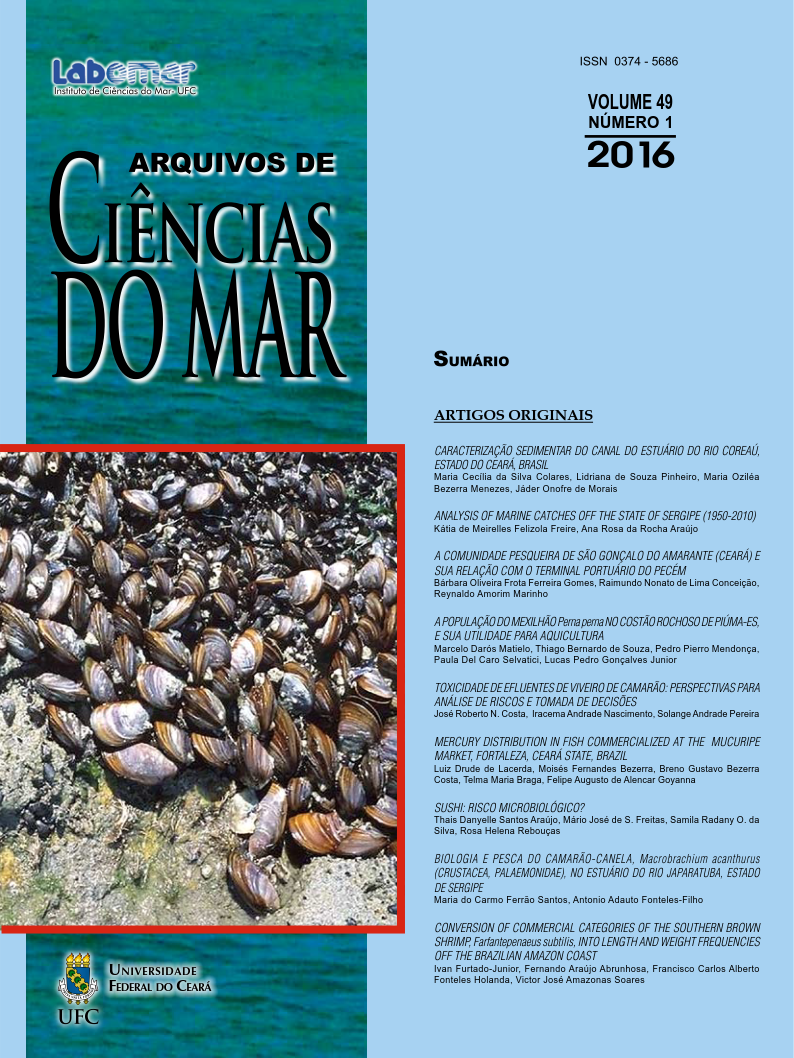ANALYSIS OF MARINE CATCHES OFF THE STATE OF SERGIPE (1950-2010)
DOI:
https://doi.org/10.32360/acmar.v49i1.6167Palabras clave:
Sergipe State, commercial fishery, landings, artisanal fishery, recreational fishery, discards.Resumen
The state of Sergipe has no official electronic version of the database of catch statistics available in printed national bulletins. Thus, the objective of this study was to update its statistics on fish production of a previously reconstructed national database to obtain a time series for 1950-2010, analyzing catch composition with higher taxonomic resolution, and estimating some missing components of fisheries. Reconstructed total catches were higher than original catches and indicated an increase in catches from 1950 to 1979. In the 1980s and 1990s a stabilization was observed, and decreasing catches from 2005 to 2010. Catches were almost exclusively artisanal. The better taxonomic resolution of the reconstructed database allowed for the identification of the following species with the highest catches in 2010: Xiphopenaeus kroyeri, Mugil curema, Ucides cordatus, Goniopsis cruentata and Macrodon ancylodon . Catches for these species amounted for about 50% of the total extracted off Sergipe in 2010. Recreational catches were estimated at 16 t in 2010, and annual discards at 818 t in the 1980s/1990s. Ornamental and subsistence catches were not estimated. Our analysis indicated that taxonomic losses are observed in two stages: when local data are compiled into a national database, and then from a national to an international one.
Descargas
Publicado
Número
Sección
Licencia
1. Proposta de Política para Periódicos de Acesso Livre
Autores que publicam nesta revista concordam com os seguintes termos:
- Autores mantém os direitos autorais e concedem à revista o direito de primeira publicação, com o trabalho simultaneamente licenciado sob a Licença Creative Commons Attribution que permite o compartilhamento do trabalho com reconhecimento da autoria e publicação inicial nesta revista.
- Autores têm autorização para assumir contratos adicionais separadamente, para distribuição não-exclusiva da versão do trabalho publicada nesta revista (ex.: publicar em repositório institucional ou como capítulo de livro), com reconhecimento de autoria e publicação inicial nesta revista.
- Autores têm permissão e são estimulados a publicar e distribuir seu trabalho online (ex.: em repositórios institucionais ou na sua página pessoal) a qualquer ponto antes ou durante o processo editorial, já que isso pode gerar alterações produtivas, bem como aumentar o impacto e a citação do trabalho publicado (Veja O Efeito do Acesso Livre).

